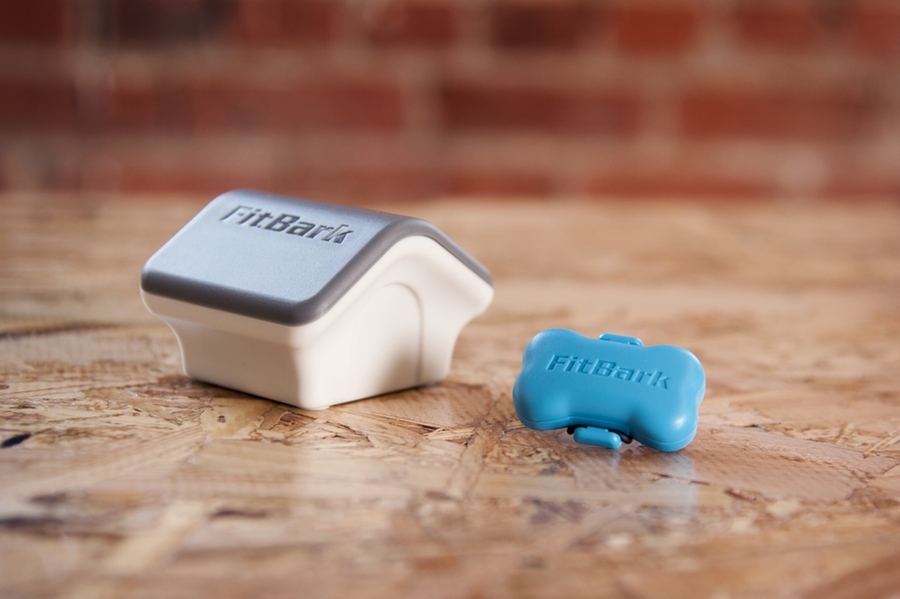Have you ever wondered what your dog does all day? Could she be feeling sluggish and ill? Did the dog walker really take him out? Davide Rossi MBA ’10 has launched a company to answer such questions not only for himself but for a wide range of people interested in the health and welfare of dogs, including veterinarians, pet food companies, and doggie day care centers.
“Our mission is to fill a huge gap in the way we understand the health and the behavior of our pets,” says Rossi, co-founder and CEO of FitBark, which makes fitness trackers for dogs. “Our first product is a beautiful activity monitor that helps owners understand the health and the behavior of their dogs.”
Designed with technical similarities to the fitness trackers people use, FitBark is a tiny wireless device that fits on a dog’s collar and conveys 24/7 activity data from a 3-D accelerometer to iOS and Android smartphones (or an optional Wi-Fi base station) via Bluetooth Smart. Owners can then check in on their dog’s activities via the FitBark mobile app. FitBark also alerts owners to signs of trouble and helps caretakers coordinate care via a user dashboard. (FitBark’s algorithms are optimized for dogs, so while using one on a cat or other animal is possible, such activity is not officially supported.)
“I grew up with dogs and realized that as owners, we are continuously guessing how our dogs are doing, when they vary from their habits, and what they really need,” Rossi says. “I was seeing what was happening with human activity monitors. I thought if it can be useful for myself, it would be even more helpful for someone who doesn’t talk, and from whom I separate myself during the day, or when I travel.”
Rossi says he has been using FitBark to monitor how his Yorkshire terrier, Freud, is doing following treatment for melanoma. “Day after day, FitBark quantifies how much his activity increases, validating that in his case the drug, coupled with surgery, really worked,” he says. “In addition, I noticed that when Freud was in pain, he collected more activity counts at night, likely because of the discomfort. Seeing this metric go down in the past few weeks was reassuring.”
While feeling well-connected to Fido is a major motivator for FitBark’s customer base, Rossi said the data his company collects also provides new scientific insights into the life of dogs. “The data we anonymously generate creates rich lifestyle data sets that help vets, insurance companies, retailers, and food manufacturers better target or validate their products and services,” he said. Such data could ultimately improve the lives of pets by facilitating medical diagnosis and remote monitoring of certain medical conditions.
Such information is not currently available, Rossi says, noting that many clinical studies on dogs use only a small number of individuals. “This is the first time we will have a chance to draw correlations based on large datasets that can be filtered by breed, age, weight, and medical conditions,” he explains.
Originally from Italy, Rossi had a variety of careers before coming to MIT Sloan for graduate school. Trained as a mechanical engineer, he began with his “dream job,” working as an engine designer for Ferrari. There, he discovered he really enjoyed running projects, so in 2003 he co-founded BRM Model Cars, a toy racecar company with which he remains involved.
In 2004, Rossi moved into the oil and gas industry, managing pipeline coating projects for Socotherm in the Middle East and Asia. He eventually decided to return to school to gain skills in finance, economics, and business.
Attracted to MIT by its reputation in the engineering world, Rossi says he was excited to learn that MIT Sloan has top credentials among business leaders. “MIT Sloan … was a no-brainer because … [it has] an approach that’s all about doing,” he says. “I’m a do-er.”
At the school, Rossi learned negotiation techniques and honed networking skills that have served him well as an entrepreneur. “Sloan was the first time for me to put myself in front of hundreds of people and learn soft skills that I am now leveraging to grow FitBark,” he says.
After earning his MBA in 2010, Rossi worked in the investment banking division of Deutsche Bank in New York City. In 2012 he left his job to explore the $60 billion pet care industry. Recognizing that there are more dogs in the United States than children and that Americans often consider their dogs family members, Rossi launched FitBark together with his sister, branding specialist Sara Rossi, and product design expert Fabrizio Filippini.
Since then, FitBark has completed a successful Kickstarter campaign, which raised more than $80,000 from nearly 700 backers. After FitBark was accepted into the highly selective Sprint Mobile Health Accelerator powered by Techstars, the company relocated from New York to Kansas City, Mo., where the accelerator is based. During this immersive program, FitBark was provided with funding, mentorship, and access to partners for networking.
The next milestone for FitBark, Rossi says, will be to complete product development and set up manufacturing in the United States. The company has a healthy pipeline of pre-orders for the device, which will retail for $99, but is $69 for advance orders, and the beta testing is ongoing. Rossi aims to begin shipping product before the end of 2014.







